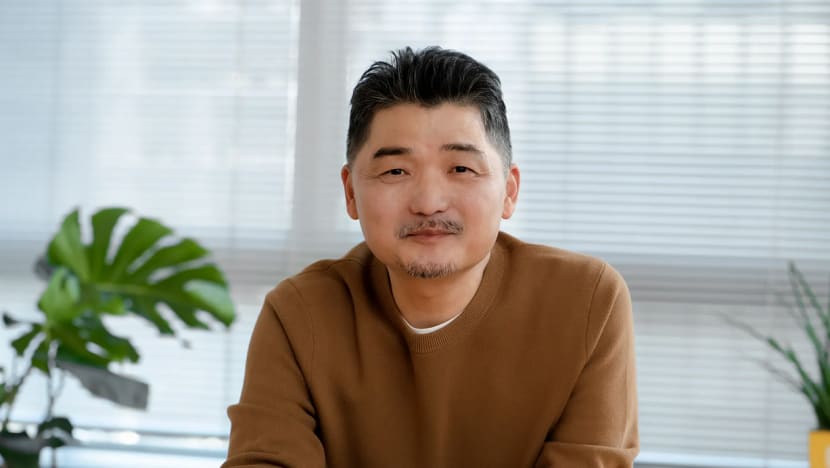Korea's richest person sees fortune fall by US$7 billion after string of scandals

A photo of Kakao chairman Brian Kim. (Photo: Kakao)
SEOUL: Brian Kim’s rise was sensational: The man who as a boy shared a room with seven family members overtook Samsung Group heir Jay Y Lee to become South Korea’s richest person.
Then the controversies began.
First were the monopoly concerns over his messaging giant Kakao as the country instituted stricter measures to avoid such practices. Then came a backlash as top executives sold shares soon after a unit’s successful public offering. And last week, the news broke that Kim might have evaded 886 billion won (US$722 million) in taxes - allegations Kakao has dismissed as “groundless".
That has taken a toll on the company’s shares, which have tumbled 48 per cent since their June peak, wiping about US$7 billion from Kim’s fortune, according to the Bloomberg Billionaires Index. It is another example of how the tide is turning for technology billionaires as a coronavirus-fuelled rally in their companies’ shares ends.
“The issues are having a negative impact on investors’ sentiment,” said Hyunyong Kim, an analyst at Hyundai Motor Securities in Seoul. “Expectations for big tech companies are falling.”
Kim, who rose from extreme poverty and was the first of his siblings to attend college, began Kakao’s predecessor in 2006 and launched its massively successful mobile messaging app KakaoTalk four years later. The company then started expanding into online banking, shopping, gaming and ride-hailing, with the COVID-19 pandemic providing another boost as fewer in-person interactions drove traffic to Kakao’s apps.
In less than two years, three of its units went public: Kakao Games, KakaoBank and Kakao Pay. And more listings are still expected, including those of Kakao Mobility and its unit that runs digital comics platform Piccoma.
But the rapid growth has put Kakao under increased regulatory scrutiny, with its market dominance being criticised for threatening mom-and-pop stores. In September, Kim pledged 300 billion won to help small merchants and said it would consider scrapping services that compete with them, such as flower delivery.
“Recently, we poignantly reflected on not realising the social responsibility as we were elated with the growth of subsidiaries,” Kim said at a parliament hearing in October. “As a company that has received public support, we will make excruciating efforts to go back to remembering how we were when we first started.”
Another scandal hit before the end of the year, when Kakao Pay executives sold some of their stakes following the unit’s sizzling stock-market debut in November, triggering a slide in shares across the group’s companies. Last week, three of the division’s most senior executives handed in their resignation.
The tax probe is assigned to the police agency of the southern part of the Gyeonggi province outside of Seoul, its spokesman said without elaborating.
The civic group that reported Kim to the police accused him of manipulating accounts to evade capital-gains taxes from the merger of Kakao and portal site Daum in 2014. In 2019, the prosecutor’s office of the Seoul Central District Court dropped a previous accusation around the same issue, the group said.
“The merger proceeded based on the agreements of the shareholders of both Daum and Kakao, and it was difficult for a specific party to have an influence,” a Kakao representative said.
Kim’s fortune, now valued at US$8 billion according to the Bloomberg index, is mainly based on a 24 per cent stake he owns in Kakao directly and through K Cube Holdings, a holding company that is effectively structured as his family office. Kim also faces allegations that K Cube violated regulations forbidding holding companies involved in financial investments from exercising voting rights in non-financial affiliates.
In the past year, Kim has increasingly pledged to give back. He promised in September he would use K Cube to fund causes creating social values, such as education. In March, he and his wife signed Warren Buffett’s Giving Pledge initiative, promising to give away most of their fortune during their lifetimes.
The tech industry is going through a rough patch as global central banks are poised to raise interest rates. The sector has slumped from its December high, with investors shunning the high-valued shares for cheaper options that they bet will help them make more money in an environment of rising borrowing costs.
“It’s yet to see how long concerns over rate increases will last, and there’s also the issue of regulation,” said Oh Donghwan, an analyst at Samsung Securities. “The current trend may continue until there’s a turning point.”













